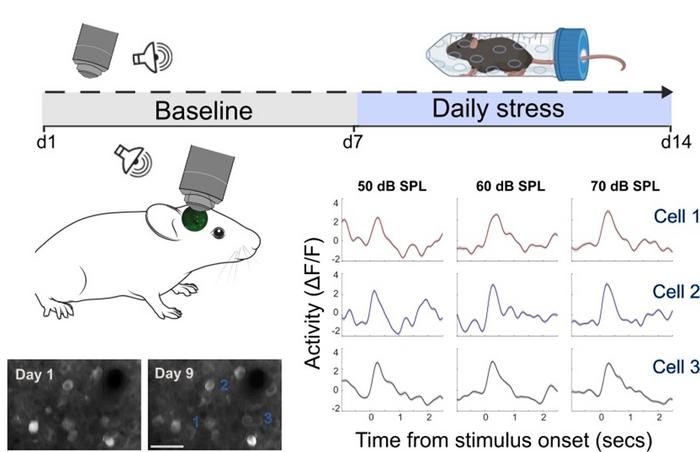Research has increasingly revealed the intricate ways in which stress can shape not only our mental state but also our sensory perceptions. A groundbreaking study published in PLOS Biology on February 11, 2025, led by Ghattas Bisharat and a team from Ben-Gurion University of the Negev in Israel, delves into how repeated stress affects auditory processing in mice, yielding insights that may extend to human experiences as well.
In the study, researchers aimed to understand the physiological and behavioral implications of stress on neural mechanisms related to sound perception. The methodology involved exposing mice to mild stress by confining them in a small tube for thirty minutes daily over the course of a week. This innovative approach allowed the scientists to simulate a form of repetitive stress akin to that which humans might encounter in daily life, reframing our understanding of how stress can distort our interaction with the environment.
The team utilized advanced two-photon imaging techniques to observe changes in neuronal activity within the auditory cortex and auditory brainstem of the mice. What they discovered was fascinating. Despite stress being a significant variable, the auditory brainstem’s ability to process sound remained largely intact, suggesting resilience in this part of the auditory pathway. However, the auditory cortex revealed a different story, highlighting a rise in spontaneous neuronal activity in response to stress, indicating that the neural circuitry responsible for processing sound was being altered.
Among the notable findings were the responses from somatostatin-expressing inhibitory neurons, which exhibited heightened activity in response to sound, whereas parvalbumin-expressing neurons and putative pyramidal neurons displayed decreased sensitivity. This suggests that stress changes the way auditory signals are processed at various neuronal levels, thus potentially leading to a mismatch in perception.
In behavioral tests designed to measure the mice’s ability to categorize sound intensity, the results were equally revealing. Stressed mice demonstrated a marked tendency to misclassify louder sounds as soft, pointing towards impaired auditory perception. This phenomenon parallels human experiences, particularly in environments where stress is chronic; individuals often react to loud noises with exaggerated startled responses or difficulty in discerning sound intensity due to heightened anxiety levels.
Furthermore, this study raises critical questions about the broader implications of stress on sensory processing. In a world increasingly characterized by stressors, understanding these neural changes could help explain why some individuals may develop heightened sensitivity to sensory experiences, such as distress from loud noises or irritability due to certain textures or smells. The research thus provides a compelling argument for considering how our daily stresses could manage or disrupt our sensory filter systems.
The team, in their concluding remarks, emphasized that these findings challenge the notion that stress is confined solely to impairments in cognitive functions such as learning and memory. Instead, this evidence reveals that stress can also interfere with basic sensory processing—an essential component of how we interact with our surroundings. As society aims to mitigate stress-related ailments, the ramifications of these findings in developing therapeutic interventions are profound.
Given the sophisticated interplay between stress and sensory perception highlighted in this study, the research has significant implications for subsequent studies. By demonstrating that repeated stress correlates with changes in auditory perception, the work lays down a marker for future avenues of research to explore further. It sets the stage for examining how similar mechanisms might operate in different sensory modalities, potentially informing approaches to mental health interventions.
At the heart of this inquiry is a pressing need to appreciate the complexities involved in how stress alters our internal worlds. With each revelation regarding the sensory impacts of stress, we uncover layers of understanding that could transform approaches to reducing anxiety or improving emotional well-being. By studying models in mice, researchers gain a foothold to eventually investigate these processes in humans, where nuances of stress response could be critical for holistic health strategies.
In sum, the research led by Bisharat et al. resonates with the growing body of evidence underscoring the profound influence that stress exerts on sensory processing. As we navigate our increasingly stressful lives, insights like these could lead to enhanced strategies for unraveling perceptions that often feel out of sync, fostering environments where both animals and humans can thrive undistorted by relentless stressors.
This study represents a significant step forward in understanding sensory perception under stress, underscoring how much more there is to discover. With a world burdened by anxiety and stress, this form of research holds the key not only to unraveling the complexities of perception but also to developing new pathways toward healing and well-being.
Understanding the interconnectedness of stress and sensory perception can serve as a reminder of the resilience present within biological systems. This ongoing line of inquiry, with its unfolding implications, calls for both attention and action as we consider the sensory dimensions of our emotional and cognitive experiences amidst daily life.
With further exploration and innovative approaches to research, we may not only decode the intricacies of auditory processing but also open new doors to enhancing the well-being of both human and animal subjects alike as we grapple with the complexities of stress today.
Subject of Research: Animals
Article Title: Repeated stress gradually impairs auditory processing and perception
News Publication Date: February 11, 2025
Web References: PLOS Biology
References: Bisharat G, Kaganovski E, Sapir H, Temnogorod A, Levy T, Resnik J (2025) Repeated stress gradually impairs auditory processing and perception. PLoS Biol 23(2): e3003012.
Image Credits: Credit: Bisharat G et al., 2025, PLOS Biology, CC-BY 4.0
Keywords: Stress, auditory processing, sensory perception, neuroscience, mental health, animal study.
Tags: auditory cortex changes due to stressauditory processing in micebehavioral implications of stress exposureeffects of repeated stress on sound perceptionimpact of confinement on stress responsesinsights into human stress experiencesneural mechanisms of auditory processingphysiological implications of stressresilience of auditory brainstemstress and sensory perceptionstress-induced hearing impairmenttwo-photon imaging techniques in research





